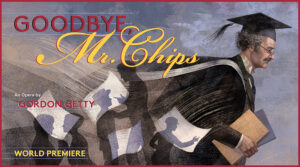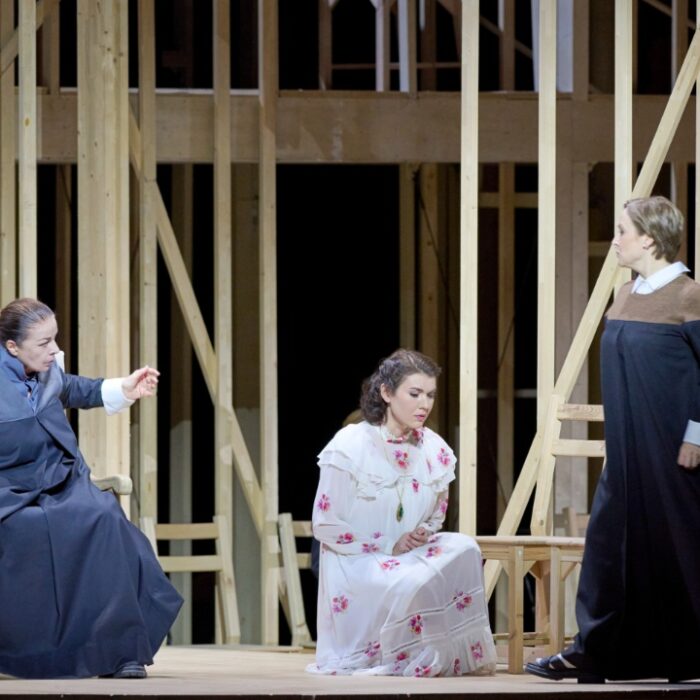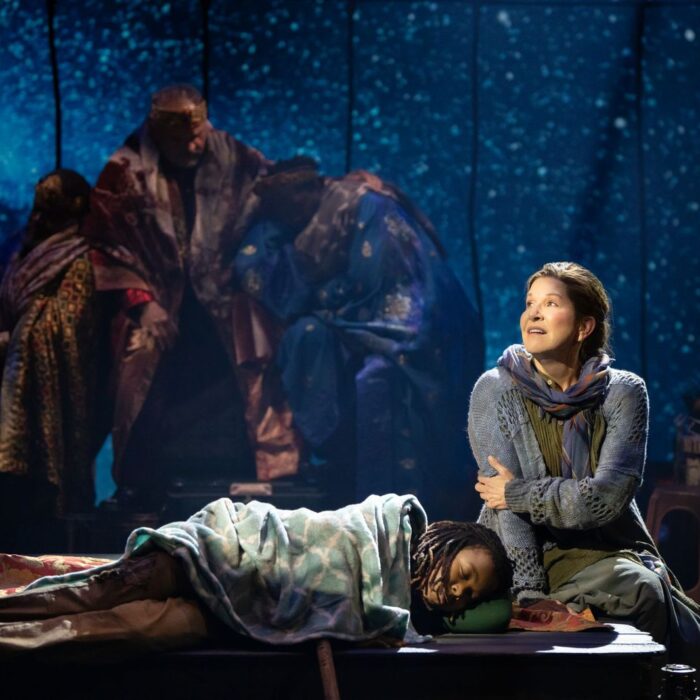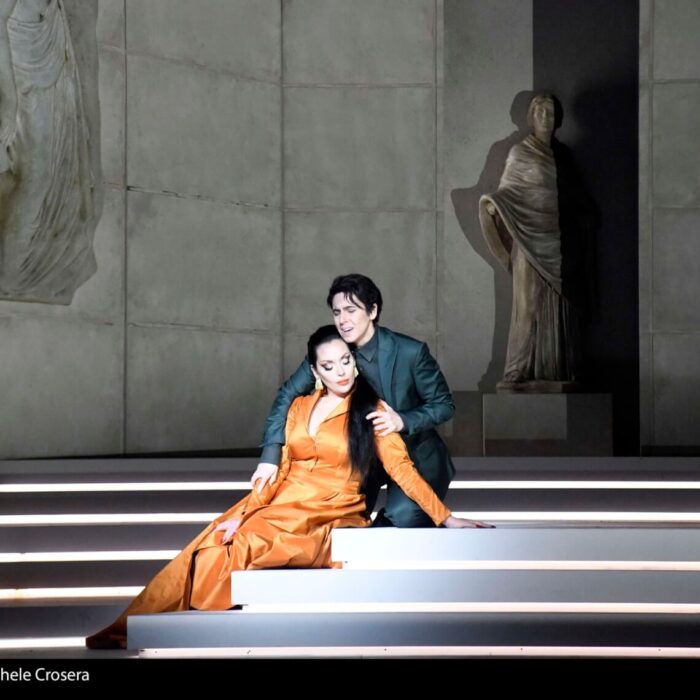
CD Review: Gordon Getty’s ‘Goodbye, Mr. Chips’
By Bob DieschburgThe score of Gordon Getty’s “Goodbye, Mr. Chips” breathes all the unpretentiously sweet melancholy of its many predecessors – from James Hilton’s 1933 novella of the same title to subsequent adaptations as, among others, radio plays and lavishly cast movie musicals.
Yet it is not exactly the feel-good opera advertised in Pentatone’s press release; rather, the eponymous Mr. Chips – “the teacher we all wish we’d had” – is a painfully grieving figure, an anachronism of sorts, happily projecting his nostalgia onto the devastating realities of the 20th century and its incumbent wars. A product of Old Europe, he does not belong in a world that has drastically outpaced his Victorianist ideals, let alone his antiquated sense for the Latin pronunciation of “Cicero.” Humor saves him from obliteration, but Mr. Chips is, in essence, of the same stripe as Korngold’s Paul in “Die tote Stadt” – someone who just can’t let go.
Not Letting Go
As his own librettist, Gordon Getty adjusts the plot to, essentially, operatic needs. The action is split into a frame story, and a metadiegetic level of Chips reliving his own memories. It oscillates between his 85-year-old self and episodes from his youth, most notably the tragically ending marriage to Kathie Bridges.
Evidently, the staging of embedded narratives is tricky. But on CD, the layering of storylines proves quite compelling, their friction, so to speak, adding to the main character’s psychological complexity. Kathie in particular is the driving force behind any of Chips’ actions. After her premature death, Chips projects the memory of her onto his very own idiosyncrasies, as when he reacts to his students’ pranks: “How Kathie would have laughed!”
“It was as if Kathie had become a part of him,” the ever so sympathetic Dr. Merrivale comments. Again, one distantly senses the echo of Paul’s pathological remembrance of Marie. Even the doppelgänger motif is of note, with the soprano being required to sing the double role of both Kathie and Linford. But overall, Getty does not draw the drastic consequences of Erich Wolfgang Korngold.
A Class Act
The music very much aligns with Getty’s professed self-assessment of being “two-thirds a 19th century composer.” It comfortably stays committed to the tonal language of the pre-avantgarde, though the deployment of chromaticism and an usual array of instruments make for a gently modernist touch to the score.
The piano, for instance, is something of a psychological barometer. It rises to prominence in the sombre keys played after Kathie’s death. At the same time, its syncopated rhythms, together with the strings, effectively cadence the flow of the narrative which, for the frame story especially, relies on the conversational, and relatively fast-paced nature of the libretto.
Getty thus sets the tone for a chamber-like intimacy, far from the grand gestures of full-scale Romanticism or the transitional styles of the early 1900s. Accordingly, the orchestra boasts a reduced brass section but, in a modern twist, expands on the percussion. The result is a somewhat theatrical, if not cinematographic feel casting the orchestra into an subtly devised mood-painting role.
Farewell, Mr. Chips
The Pentatone recording relies on the unmitigated enthusiasm of its principal singers.
First and foremost, Nathan Granner is a stunningly charismatic Mr. Chips, phrasing vividly yet coating every expressive nuance with his recognizably honeyed tenor sound. The absence of any self-contained arias may not do justice to his mere vocal skills; but his interpretive acuity asserts itself in many places, most notably perhaps in the extended lyrical solo of “I’m afraid that six Brookfeldians have died this week.” Standing in the chapel, Chips reads the names of Brookfield alumni killed on the Western front when an air raid siren suddenly goes off, and explosions are heard. The scene masterfully crescendoes into the boys’ choir chiming into the already cacophonous soundscape, and Nathan Granner’s solemnity is increasingly interspersed with quivering moments of anxiety.
Granner finds his equal in Lester Lynch’s wonderfully empathetic Dr. Merrivale who, in the novel, is a secondary character at best; yet with Gordon Getty, he assumes the primary function of being the narrator. Though the part does not call for vocal extravaganza, it requires sustained gravity, malleable diction, and a pitch-perfect sense for dramatic timing. Lynch provides all of the above, and his characteristically fast vibrato adds an air of venerability to the kind doctor.
Finally, Melody Moore’s interpretation is pivotal to the drama’s strong emotional impact. Her role, and especially the ariose “Chips, darling, it’s started,” are Getty’s most traditionally operatic creations per se, with her long monologue arching into ethereally sustained tones, and a resounding climax. The American soprano’s often diaphanous voice is also apt to suggest an otherworldly presence; after all, Kathie makes ghostly comebacks until the opera’s grandiose finale in Act two.
An All-American Affair
An all-American affair, “Goodbye, Mr. Chips” is further enlivened by the irreproachable performances of Kevin Short in the double role of Ralston and Rivers. But only thanks to the remarkably warm colors drawn from the Barbary Coast Orchestra does Gordon Getty’s quirky schoolteacher emerge whole from what could easily be perceived as a somewhat fragmented compilation of tangentially related episodes. Conductor Dennis Doubin is not to be rushed, and one readily appreciates every bit of patiently shaped melody, whether instrumental, vocal, or in conjunction with the stirringly glorious San Francisco Boys Chorus.
“Mr. Chips” escapes every attempt at conventional categorization. Despite its modern facture (with some limitations), its two-hour run betrays a deeply felt nostalgia for things well beyond the scope of opera. Chips’ death scene, in particular, is transcended by some life-long yearning for a world sadly gone by. Gordon Getty conjures the memory of it.


